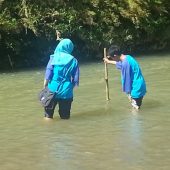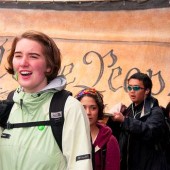
Water cycle literacy attracts great attention to the observers of climate change. Local and global impacts of the water cycle threaten human life and damage the Earth. Education is expected to be able to provide a way out of this problem. A Conservation-Based Learning (CBL) model was employed to understand the water cycle literacy among students in three cities in East Java province, Indonesia. There were 6 (six) Senior High Schools with a total number of 396 students serving as the sample. Each school consisted of common classes and CBL classes. Water cycle literacy aspects included knowledge, values, cognitive behavior, and acting behavior. The data were analyzed using a descriptive quantitative, and qualitative approach. The data were analyzed using a descriptive quantitative, and qualitative approach. The literacy aspect of values, attitudes, thinking, and acting skills in the water cycle in the CDL class is higher than that of the common class. Learning the water cycle using the CBL model gave significant effects on the students’ strengthening of water cycle literacy (sig. 0.5).
Continue Reading
Riki Ott uses “ultimate civics” to inspire students to take action and make a change. Here, she puts forth the foundation for her curriculum that brings students out of the classroom and into the political arena, with the goal of eliminating our addiction to petroleum.
Continue Reading